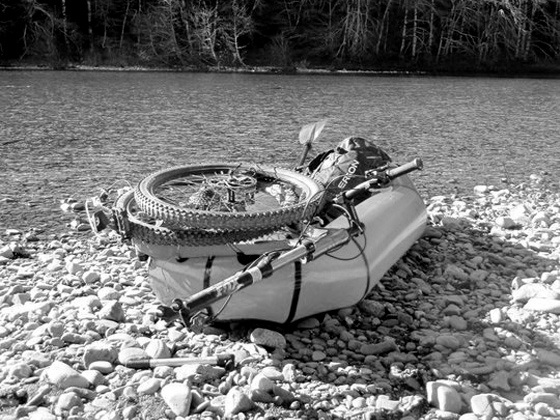In planning his expedition, Andrew has teamed up with Adventurers and Scientists for Conservation in search of a scientific partner. ASC found him two. Over the course of his trek by land, Andrew will collect millipede samples for Bruce Snyder of Kansas State University. Millipedes are an extremely diverse species of arthropod – so diverse that there are an estimated 68,000 species globally which have yet to be described. The remote areas Andrew will be covering will yield important samples for Snyder’s research on this ecologically precious class. Information on biodiversity and biogeography can serve as a foundation for conservation efforts surrounding these (and other) soil organisms. During his time in rivers, he’ll collect bone samples for Tom Evans of Montana State University. Evans’ research deals with what the transport and deposition of skeletal remains in rivers can tell us about fossils.
Fatbike Rafting the Arctic commences in late March 2012. To learn more about Andrew and his motivation, visit www.77zero.org. To learn more about Bruce Snyder and his research through ASC, click here: https://www.adventurescientists.org/millipedes.html.
In a few short weeks, Andrew Badenoch will set out on an expedition to prove that world travel and exploration is possible without the use of environmentally destructive fuels. By packraft and fatbike Andrew will head north from Bellingham, Washington. Journeying through Canada to the Arctic Ocean, he’ll travel the coastline before making his way south through Alaska’s interior. He’ll finish his loop back to Bellingham via the Pacific Coast, completing a 7,000 mile, fuel-free expedition. The few tools he’ll need to power electrically (a UV water purifier, phone, satellite uplink and e-reader for note taking) will be powered with portable solar panels and a generator on the front wheel of his bike.
Fatbike Rafting the Arctic is part of Andrew’s larger 77Zero project, dedicated to traveling the seven continents and seven seas, all the while proving that humans can (and must) thrive without fossil and farm grown fuels. Fatbikes are essentially mountain bikes with wide tires, capable of traversing terrain unapproachable by ordinary bikes. Packrafts are lightweight, one person, extremely compactable rafts that can be conveniently backpacked. Fatbikerafting is the beautiful marriage of these concepts, allowing for efficient, continuous, and clean travel through remote areas. As Andrew describes it on his website, www.77zero.org, “Fatbikerafting is the closest we can currently get to the sailing aesthetic inland.”

